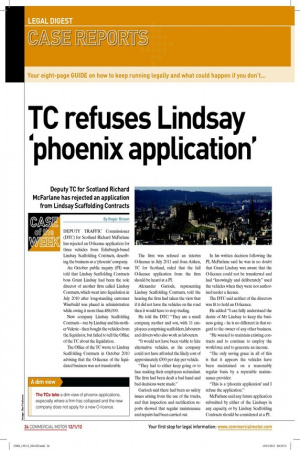TC refuses Lindsay ‘phoenix application’
Page 16

If you've noticed an error in this article please click here to report it so we can fix it.
Deputy TC for Scotland Richard McFarlane has rejected an application from Lindsay Scaffolding Contracts
By Roger Brown
DEPUTY TRAFFIC Commissioner (DTC) for Scotland Richard McFarlane has rejected an O-licence application for three vehicles from Edinburgh-based Lindsay Scaffolding Contracts, describing the business as a ‘phoenix’ company.
An October public inquiry (PI) was told that Lindsay Scaffolding Contracts boss Grant Lindsay had been the sole director of another irm called Lindsay Contracts, which went into liquidation in July 2010 after long-standing customer Wisebuild was placed in administration while owing it more than £86,000.
New company Lindsay Scaffolding Contracts – run by Lindsay and his mother Valerie – then bought the vehicles from the liquidator, but failed to tell the Ofice of the TC about the liquidation.
The Ofice of the TC wrote to Lindsay Scaffolding Contracts in October 2010 advising that the O-licence of the liquidated business was not transferable. The irm was refused an interim O-licence in July 2011 and Joan Aitken, TC for Scotland, ruled that the full O-licence application from the irm should be heard at a PI.
Alexander Garioch, representing Lindsay Scaffolding Contracts, told the hearing the irm had taken the view that if it did not have the vehicles on the road then it would have to stop trading.
He told the DTC: “They are a small company, mother and son, with 11 employees comprising scaffolders, labourers and drivers who also work as labourers.
“It would not have been viable to hire alternative vehicles, as the company could not have afforded the likely cost of approximately £300 per day per vehicle.
“They had to either keep going or to face making their employees redundant. The irm had been dealt a bad hand and bad decisions were made.” Garioch said there had been no safety issues arising from the use of the trucks, and that inspection and rectiication reports showed that regular maintenance and repairs had been carried out. In his written decision following the PI, McFarlane said he was in no doubt that Grant Lindsay was aware that the O-licence could not be transferred and had “knowingly and deliberately” used the vehicles when they were not authorised under a licence.
The DTC said neither of the directors was it to hold an O-licence.
He added: “I can fully understand the desire of Mr Lindsay to keep the business going – he is no different in that regard to the owner of any other business.
“He wanted to maintain existing contracts and to continue to employ the workforce and to generate an income.
“The only saving grace in all of this is that it appears the vehicles have been maintained on a reasonably regular basis by a reputable maintenance provider.
“This is a ‘phoenix application’ and I refuse the application.” McFarlane said any future application submitted by either of the Lindsays in any capacity, or by Lindsay Scaffolding Contracts should be considered at a PI.
A dim view
The TCs take a dim view of phoenix applications, especially where a firm has collapsed and the new company does not apply for a new O-licence.












































